#whose ass
Explore tagged Tumblr posts
Text

the riddler secrets in the dark???? he's coming out???? as a pain in the ass????
#whose ass#dc#barbara gordon#edward nygma#batman unburied#the riddler: secrets in the dark#found out about this like two days ago#im excited for. more batman unburied dynamic#im also BUSY but like ignore that right#RIGHT#i gave up on eddies design ill make it better next time...#dennis doodles
291 notes
·
View notes
Text


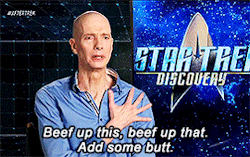

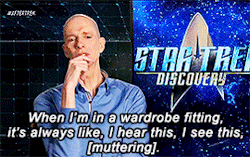



Saru: A Flat Ass Icon
#star trek#star trek discovery#saru#doug jones#st disco#dsc#trekedit#my stuff#gifset#whose job was it to search for and zoom in on the perfect view of dat ass#when i'm the idiot doing it for free
6K notes
·
View notes
Note
*carefully picks you up and peeks into your conch snail shell*
Ehm... Sorry to bother, but... Could we, maybe, possibly... see Vasco's wife and her lover pictured by your hand? Sorry again, thank you for listening. Take care.
*delicately lays you back into the water to prevent any stress or dehydration*
Unfortunately I don't have her lover figured out yet, but I think Ludovica looks something like this:
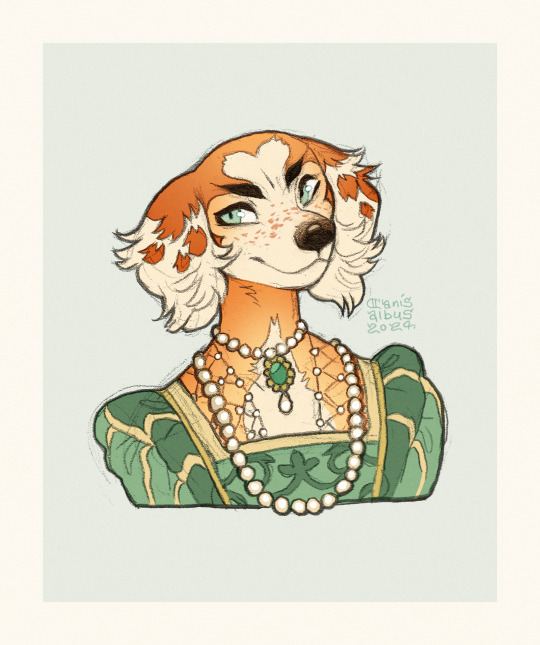
#own art#own characters#CanisAlbus#Ludovica#vertopus#Vaschete lore#I may still tweak the markings this isn't 100% guaranteed final design#might make her colors a bit more reddish perhaps#but you know this is the general vibe#she was originally inspired by brittany spaniels and one of my old unused characters#to be fair the whole thing was built around the idea that she should have strong eyebrows and green theme color#again jury is still out on the renaissance hairstyle/head piece I'll try to come up with something#still trying to get a good grasp of the girlfriend too#she's most likely her lady-in-waiting or other court companion#essentially a woman of high social class whose job is to accompany a noblewoman and assist her on her daily activities#a best friend more or less#conch snail hours#she will kick anyone's ass. she will kick your ass. she will kick your dog's ass. she will kick her own ass.
4K notes
·
View notes
Note
Wait you had autism and still got along with the other kids and knew what was going on with them?? I was never able to do that! I still chose to do my own thing but would have been unable to answer those questions.
I mean I didn't really WANNA make friends for a super long time so it didn't really matter? And if anyone was outright mean I don't think I noticed till like 6th grade.
After 6th a few other kids liked to throw or kick things at my face or steal my art supplies or give me mean nicknames- I remember almost all the boys in my class one year started a thing where if I got within 4 feet of them they'd yell "[tea] GERMS!" and make a dramatic mad-dash escape, and that was kinda hurtful, but IDK how long that was a thing??
Anyhow I started asking them if they had a crush on me or if they were just stupid, and when they asked what I meant I'd just be like "well there's two reasons boys act stupid around girls. Either you have a crush on me, or you're just always this stupid"
And that invariably led to them yelling "I'm stupid, I'm stupid!" or telling me, "I'd rather say I'm stupid than say I like you!"
Which might have been hurtful if I wasn't growing into a mild superiority complex that assured me I was smarter than them, and nicer than them, and there was really no need to desire the approval of stupid, mean people.
(This was, of course, backed up by the fact that my father was one of those mean, stupid sorts of people, and I fully beleived if I could handle him, I could handle anyone my size, and so what if you dont like me? My own dad doesnt like me, am i supposed to value your opinion?)
Then by highschool I got hot, and if one of them started chatting me up I'd just be like "You wrote in my yearbook in 2002 that I was a huge loser. Why would I want to hang out with you"
And by THEN I'd met enough genuinely fun, interesting people who actually liked me that I was never around anyone who openly disliked me anyways.
Not until I started to realize I wasn't 100% a girl and cut my hair off- Then I started hearing other girls whispering to each other that I looked like a lesbian- gasp- which, again, was actually pretty funny, 'cause then I'd just tell them not to get their hopes up 'cause I wasn't available.
Then I graduated, and moved, and it turns out I'm actually kind of hot funny smart and successful, and whenever I fall into the deep deep pit of dumb ugly stupid imposter-syndrome, I remember that as mean as other kids were sometimes, their parents thought I was the best.
So anyways get fucked Gabe from ninth grade, your mom used to give me candy and bail me out of detention. I had the biggest fucking crush on your mom dude
#But uhhh I guess if I can give anyone in the weirdo seat some advice it'd be Prioritize whose opinions you care about#Learn to like yourself#and Don't take any of that shit seriously like the MINUTE you get out it stops mattering#Also I'm a security guard now so I've hauled Gabe's drunk on a Tuesday stupid ass out of ditches a few times#That definitely makes things better#I never forgot the hockey puck Gabe you dumbshit#How's your mom
1K notes
·
View notes
Text
Just your reminder that this actually happened:
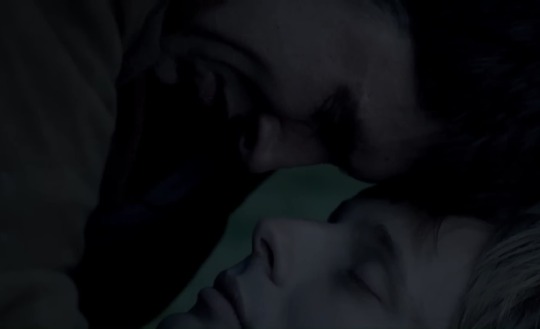
What’s even worse is that Merlin pulls and turns Arthur’s head to him, just so that he can… Brush their foreheads together, for the first and last time.
#i’m not doing well if you didn’t notice#‘stay with me’ my ass#he’s dead merlin#you idiot#can you not see that?!#yeah exactly#and whose fault is that?🙄#WHY#JUST WHY#THIS SCENE HAUNTS ME#merthur#bbc merlin#merlin#arthur pendragon#merlin bbc
1K notes
·
View notes
Text
Svsss is the funniest book ever written and I'm tired of pretending it's not
Chapter 17 is a ride. Shen Qingqiu's non-threesome fiasco was fantastic. But while all that was happening Liu Qingge was on a whole Liam Neeson Taken journey and we need to discuss that because I can't fucking breathe:
Luo Binghe kidnaps Shen Qingqiu, Liu Qingge goes "count your days bitch", powers up to the max and singlehandedly massacres his territory.
He doesn't find his beloved frenemy coworker there but he runs into Shang Qinghua. He's about to interrogate him in the only language he's fluent in (violence) but he doesn't even get to raise a fist before he frantically spills every last detail of Shen Qingqiu's whereabouts.
After he's satisfied he's like "Nice. I shall strangle the traitor now." But the guy just falls on his knees?? And clings to Liu Qingge's thigh and just starts sobbing?? Gets snot all over his robes???
Before he can put an end to that mess, PLOT TWIST apparently Shang Qinghua has domesticated Mobei-jun while no one was looking?? All the crying and the clapping of his asscheeks alerts the demon that something's up and he comes do defend his pet hamster.
It's kind of a holdup on the rescue mission but they fight and they fully level half of Luo Binghe's crib in the process.
After that, he gets to the southern border. Fights some disgusting blood clot animals and successfully snatches his shixiong back, time for quality quiet time together! Perhaps some sparring!
But NO. The mission is too successful and got an unfortunate add-on: the weirdo bitch who slept with Shen Qingqiu's corpse for 5 YEARS came along??? The one he battled for just as long to get it back??? And now they're attached??? And trust each other???
Too tired to fight this reality he watches as the demon bastard peacefully naps on Shen Qingqiu's shoulder. Grinding his teeth.
ALL THIS IN THREE (3) PAGES.
#AND THIS IS THE RETELLING BY A MAN WHOSE VOCABULARY MAINLY CONSISTS OF “GET OUT OF MY CAR”#who knows what this man left out because he hates talking and also binghe was cuddling sqq#i just know in his head he was like#“ewww brotha... brotha ewwww....”#he doesn't even say how the mobei-jun fight ended#but given how he 1v1d tianlang-jun in tiptop shape it's safe to say goth elsa got his ass THOROUGHLY handed to him#best fucking piece of media ever. it should be framed in the louvre.#i do like binghe btw i just think liu qingge had an absolute whiplash of an afternoon that day#scum villain self saving system#svsss#mxtx#liu qingge#shen qingqiu#shang qinghua#mobei jun#liushen#if i misused the shixiong term please tell me these honorifics are a nightmare
614 notes
·
View notes
Text

not to brag or anything, but my hospital notes have a little compliment
#are they allowed to add mean shit if they don't like you?#like if I were snippy could they say 'Stothers is a trashy ass 30-year old whose bones deserve to snap'?
2K notes
·
View notes
Text
Another thing that haunts me about this entire thing is that Amanda wasn’t just funny like her coworkers, or funny like other Disney and Nickelodeon actresses. Amanda Bynes was funny like Carol Burnett. Funny like Lucille Ball. She was effervescent and classic. Her comedic sensibilities were deeply intelligent. She had *it*. And she should have grown into one of the best actresses of our generation. But *something* happened and derailed it all. Even if she’s not the same, I truly hope she’s well and happy. I want nothing but the best for her, even if it’s a quiet and private life. I adored her back then and always will.
#Amanda Bynes#quiet on set#it feels ghoulish to hope she comes forward with her story#we aren’t owed anything#I think she just felt like a friend to everyone and we all want to know how to help our friend#whose ass do we need to kick#can we fight for you can we support you can we help you with what you’ve gone through#dan schneider#Nickelodeon#the Amanda show#I spent so much time on amandaplease.com at the library
2K notes
·
View notes
Text
"The Lion Has Its Own Historian:" Parallels Between Gorgo and Aglaea
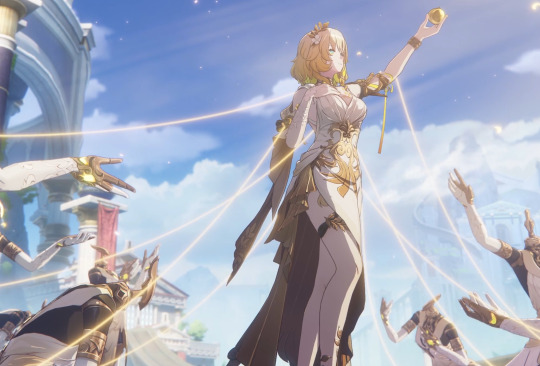
While re-reading Mydei's "As I've Written" stories recently, I was intrigued again by the (seemingly impossible) section in which Aglaea unknowingly echoed Gorgo's words to Mydei, and this led me down a rabbit hole of thought: The roles of Aglaea and Gorgo--not only in Mydei's life but also in the story overall--form some interesting parallels that are worth looking at in closer detail.
Seize the Means of Control
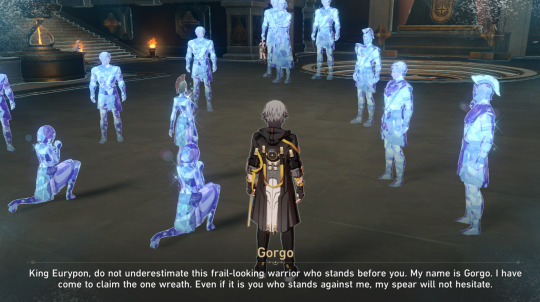
Gorgo's ascension to a position of authority was predicated on power--not only on her martial prowess, which was expected in her culture (i.e. slaying a lion with her bare hands), but through her courage to meet the existing symbol of authority, Eurypon, in single combat and not concede. In Kremnos, status is conferred and maintained through violence. Though on the surface Gorgo defies this belief, she ultimately remains an active participant in Kremnos's tradition of "might makes right" through the Kremnos Festival, reinforcing rather than rejecting her culture's military-centric social structure.
Although Gorgo originally took part in the Kremnos Festival with the intention of beating Eurypon and seizing the throne of Kremnos for herself (presumably because she thought she could rule better), she ultimately chooses to accept his continued leadership and become queen instead, even granting him an heir to cement his legacy. In this way, despite presumably wishing for a less wasteful (of life) philosophy for the Kremnoans, Gorgo becomes one of the foremost beneficiaries of the very mindset she opposes. She clearly wants to reduce the meaningless bloodshed in Kremnos--she strongly rejects the notion of patricide, for example--but she doesn't (at this point) reject the overall structures of the Kremnoan culture, including the belief that combat ability should determine who leads.
In short, her position of authority was achieved strictly through her ability to oppose her foes.

Despite coming from a wholly different culture, one which (ostensibly) values debate, diplomacy, and the rule of law as the primary tools for establishing status, Aglaea's rise to power was remarkably similar to Gorgo's. The game confirms that the prominence and influence of the Chrysos Heirs in Okhema is no lucky accident--instead, Aglaea has clawed her way to the top, fighting tooth and nail to establish herself as a figure of authority in the Holy City.
We're told she exerts her pressure both through economic means, amassing wealth via monopoly on resources such as Amphoreus's internet, and through literal bloodshed.

The story dances around it, but Star Rail's marketing embraces it: Aglaea represents not just the joy of love but also the "deadliness" of romance, the figure of power in Okhema "pulling the strings" and making others dance to the tune of her vision for the future. She basically rules the roost in the Holy City in large part because of her capacity for violence, because of the literal physical and political power she wields as a demigoddess and the leader of the strongest group of fighters on their entire planet.
This "silk concealing steel" behavior reflects not just how she approaches any who oppose her--the Trailblazer and Krateros, for example--but also how even the NPCs throughout Amphoreus view her:
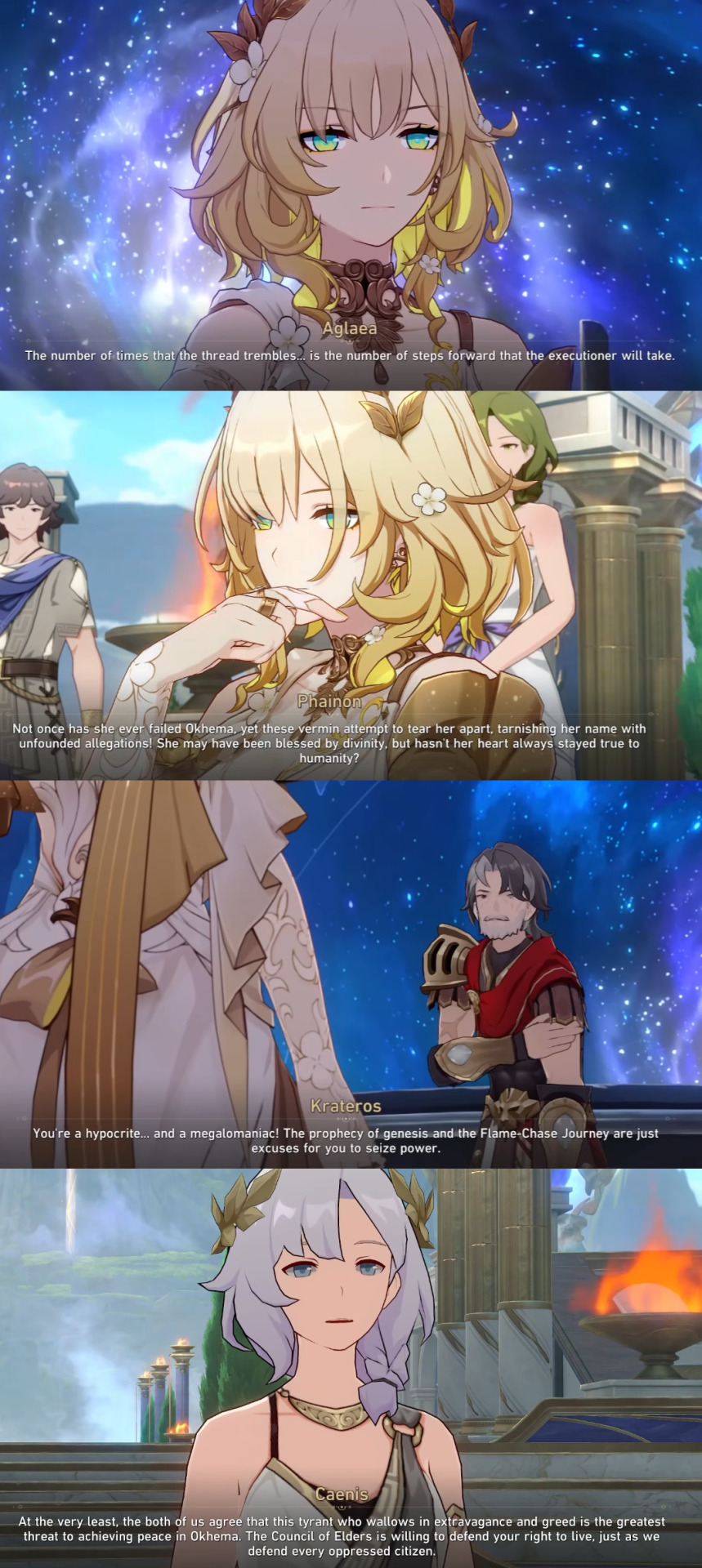
It's particularly Krateros's view of Aglaea which intrigues me, because the very same things he accuses her of are the things Castrum Kremnos is famous for (being warmongers, usurpers of power, etc.). By all rights, he should admire a "queen" such as Aglaea who rules by force and who is leading her people into the greatest war Amphoreus as ever known. And yet he and the rest of the Kremnoans seem to revile Aglaea for the very same things they saw as virtues in Gorgo.
The context is the key: Gorgo seizing power for herself is viewed as honorable and good because it happened in the context of Kremnos, while Aglaea's power struggle and military dominance occur within the so-claimed peaceful structure of Okhema's democratic society, casting her in the role of a "power-hungry tyrant" for the people living in Okhema, even those who should most appreciate her mindset.
Comparing Gorgo and Aglaea in this way highlights a key double standard in the way the Amphoreans react to women who rise to power, and makes it clear how thin the veneer of Okhema's "peace" really is. Stepping to the top rung of the social ladder through the threat of martial retaliation, Aglaea's battle against the Council and the Flame Chase's foes is no different from Gorgo tearing a lion apart with her bare hands, challenging a king, and taking her place at the top of Kremnos's hierarchy by seizing her weapon and making her stand. All that differs is how violence is received in their contrasting cultures, resulting in two diametrically opposed reactions from the "mere mortals" around them.
With Violence as Your Tool
I think it's important to emphasize that Aglaea and Gorgo also parallel each other not just in their rise to authority through physical power itself, but also in their stances on the necessity of that power: Both Aglaea and Gorgo (at least at first) view bloodshed as a necessary evil, an unpleasant facet of life that one must accept in order to achieve a goal. Violence, for both Gorgo and Aglaea, is a tool.
We see this clearly with Gorgo throughout her flashbacks, both in her initial fight with Eurypon (where she claims she would embrace the notion of death only so long as it is not "unnecessary") and in her other confrontations with Eurypon: Gorgo insists that the tradition of regicide must be broken and makes Eurypon promise not to lead Mydei to that path--yet later, she goes so far as to scold Eurypon when he shies away from his fate, essentially calling him a coward for fearing the prophecy that Mydei would one day kill him. "What prince of Kremnos hasn't killed his father?" she taunts, implying that, even as Gorgo fought to change the violent history of Kremnos, she still believed--at least at that moment--that refusing to face violence when it was foreordained made Eurypon a weak and unfit ruler.

However, we ultimately see this stance change. In Mydei's dream of training with his mother, Gorgo reveals that nearly losing Mydei completely changed her perspective on Kremnos's beliefs, finally killing any faith she had in their system of rule and their constant pursuit of Strife for strife's sake. She rejects the notion of combat being the ultimate test of a person's worth, explicitly casts aside her title and role as queen of Kremnos, and embraces a kinder identity as strictly "Mydei's mother." This is a crisis of faith brought on by experiencing the impacts of Kremnos's faith firsthand--by being forced to experience grievous loss, Gorgo is implied to have grown as a person, from one who is willing to accept violence as a tool to get ahead, into one who solely values peace.
These views, too, mirror Aglaea's pursuit of the Flame Chase Journey and her "hidden" feelings toward its necessary loss. We know already that Aglaea views the threat of violence as her go-to "means to an end" when it comes to achieving the Chrysos Heirs' goals.

She is not at all above putting people into harm's way to pursue the prophecy, such as letting Phainon take the Strife trial even knowing that he would fail, and she tells us players over and over again that her own humanity has nearly vanished, claiming that she now no longer has sufficient empathy for humankind to be swayed away from the path of Era Nova.

This is clearly not true (given how deeply she cares for Tribbie, how kind she is to Castorice, and how unwilling she is to actually bring any harm to Anaxa), but Aglaea insists on this emotionless illusion likely because it makes it easier to tolerate the cruelty required to continue pursuing her goal--she needs it to be true that the last of her humanity has already waned, because this is what makes it easier to accept that the Flame Chase Journey is a journey of "loss," one that is fueled by bloodshed.
It is an unfortunate truth of the prophecy that people will die in pursuit of the dream, that capturing all the coreflames and pushing the world forcibly into its next cycle will cost lives and require cold, rational decisions that will crush people's happiness and freedom. Aglaea cannot hesitate, cannot waver, cannot choose kindness over action.
But, like Gorgo, we know that accepting violence as a tool does not mean that the person wielding the tool is always happy to do so. As Gorgo loses her genuine faith in Kremnos's beliefs and begins to view training Mydei for war as nothing more than a rote requirement, devoid of meaning, Aglaea too struggles to uphold her emotionless facade, a protective cocoon whose cracks reveal the enormous weight she is bearing and how deeply the inhumanity of her own decisions wounds her.
We see this clearly in her character stories, where the actions and then later loss of her maid completely reshape her definition of "beauty":
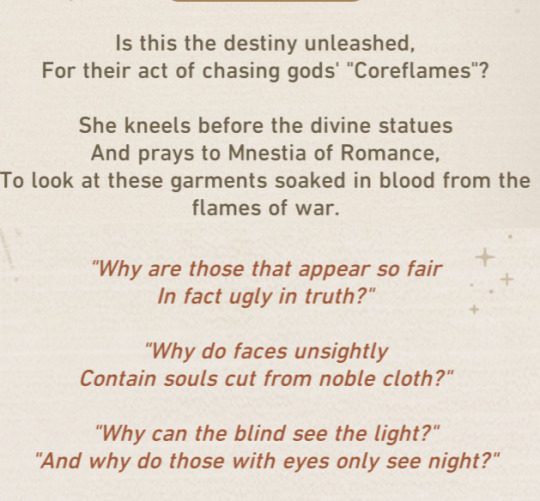
And we also see it very clearly in her behavior toward Anaxa, where she hesitates at the crucial moment, unable to commit to the course of action that she herself set in motion:

Like Gorgo who longs for a softer world where she can simply be Mydei's mother, Aglaea too (no matter how much she claims) has not lost the part of herself that cares not only for the people closest to her but even for the innocents of the world, the boy who wants to bring his sister something beautiful, the girl who shares her bracelet...

Her nature, no matter how much of it has worn away, is at its core humble and kind--reviling the pain of others.
It's this fundamental conflict between love and what must be done that lends both Gorgo and Aglaea their depth as characters, that grants them both an air of nobility, in the way that everyone good who suffers is noble. Being forced to cause harm without a desire to do so creates quintessentially contradictory characters, making the audience privy to both their external mettle and their internal hesitation, easily humanizing both of them. Aglaea and Gorgo are virtuous women whose cruelty is justified for the greater good. Yet in watching both of them struggle under the immense pressure of that cruelty, we recognize the inherent evil of a world that forces kind-hearted people into positions where bloodshed is their only path forward.
Both Aglaea and Gorgo are not women who normally hesitate to seize the tools available to them, or the kind of women who will shy away from wielding their strongest weapon--the threat of death--with impunity. The reaction to female characters who are willing to exert this kind of power over others (including over the men in their lives) both in-game and in the fandom (where Aglaea in particular is treated poorly for her "coldness") demonstrates how unique this particular type of female character still is, and suggests interesting overall power dynamics in Amphoreus that privilege women willing to utilize violence even above men who choose the same route, despite the strong patriarchal bent one might expect of a story with ancient Greece as its primary influence.
Mydei is not the son of Eurypon, but explicitly and always "the son of Gorgo" even in flashbacks where Eurypon is still alive; in Okhema, both the Chrysos Heirs and the Council appear to be primarily directed by women (Caenis occupies the more visible role of Aglaea's opponent than Lygus does), with all of Okhema's demigods (including Cipher) being female. Gorgo's violence is regarded as honorable; Aglaea is met with disapproval from her peace-loving society but no one ever actually dares to stop her. Perhaps Krateros comes closest, by defying Aglaea's will and entering the Strife trial without her permission, but even he ultimately has to be rescued from Aglaea's clutches by Mydei, who explicitly invokes his mother's name to ensure Krateros's safety. Say it with me: The male character with the highest social status in all of Amphoreus has to rely on the power and reputation of his mother to rescue another man from a powerful woman. Amphoreus really said "Ladies first." 💯

Anaxa's reactions to Aglaea are humorous but are also a perfect example of this overall social structure in Amphoreus which assumes strong women in power have an automatic degree of legitimacy because they are willing to seize violence as their means, despite violence being, in real-world cultures at least, stereotypically the domain of men. In 3.1, Anaxa simply accepts it as a given that he will become Aglaea's prisoner and that she will be able to do whatever she wants to him, because nothing in Okhema's social, political, or military structures would enable him to genuinely oppose her (if he even wanted to).

Even in his (sort of) fake-out "siding with the Council" phase, all Anaxa does is move himself from the grasp of one powerful woman to the next, shifting from being Aglaea's prisoner to Caenis's ace. Cerces even has an entire voiceline where she points out word-for-word that Anaxa is functionally just moving from one woman's cage to the next. Caenis in particular seems to view Anaxa as an object, a biting dog she can keep on a leash until she sics him on her enemy. Anaxa obviously is not so easily manipulated, but Caenis's threat about karma eventually comes true, and he nevertheless suffers the final wrath of the Holy City's society, being judged more harshly than anyone else for his seeming unwillingness to submit to the power of either woman in control of Okhema.
Both literally and thematically, the game tells us players that Aglaea and Gorgo are courageous and effective leaders because they live by the blade, because they are willing to harden their hearts and do whatever it takes, whether that means taking another's life--or their own.
To Usher in a New Era
Of course what really distinguishes both Gorgo and Aglaea's willingness to cause harm from malevolent forces in Amphoreus is their ultimate intent. Although both women are willing to do whatever it takes, they do so only in service to a greater purpose, one that they believe will better their world. In this way, Amphoreus's writers reinforce the underlying impression in Amphoreus's plot that women are more trustworthy and reliable leaders than their corresponding male counterparts. Slight side note on this, but it's kind of funny just how consistent this is--even "outside" of Amphoreus, Welt and Sunday had to turn to Herta to save the day, while inside Amphoreus, Trailblazer is still relying on Acheron's advice to get them through. (When you cater to the incels so hard you somehow loop back around into writing staunchly feminist plotlines...)
The message, repeated and unsubtle, is that there is a link between women's leadership and righteousness, with both Gorgo and Aglaea representing an idealistic desire for a better future for Kremnos and Amphoreus as a whole--one by opposing fate and the other by enforcing it.
Both Gorgo and Aglaea face prophecies that promise to reshape the world as they know it, prophecies which require them to make decisions that will ultimately cost them their lives in a desperate bid to influence history toward the best path. Gorgo rejects the prophecy she is given, determined to protect Mydei despite the destruction the omens claim he will bring to Castrum Kremnos.
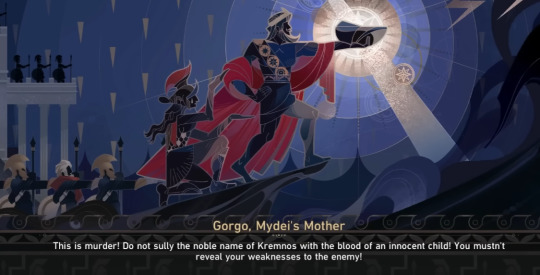
Because of the players' predilections for Mydei, this choice to reject fate paints Gorgo as a heroine, an unselfish and moral person who will choose the life of an innocent child over she own safety. Her willingness to fight to the death to prevent Eurypon's atrocity against their son flies in the face of fate itself, attempting to stop an inevitable, self-fulfilling prophecy.
And, in fact, the game even teases us with the idea: What would Kremnos have been like if Gorgo succeeded? When Mydei returns to Kremnos, he either "envisions" or actually experiences (via timelines bleeding into each other), a seemingly parallel universe where Gorgo succeeded in saving him from the Sea of Souls, and where she clearly rallied the people of Kremnos to her cause. The Kremnos we see in that vision is entirely different from Eurypon's:

The people are happy, rejoicing and at ease, talking about pomegranates and writing and playing games with kids, while the sun paints the whole city in a soft and gleaming gold.
Contrast that with the Kremnos that Trailblazer and Castorice find when they travel back into the past where Eurypon betrayed his wife and left Mydei in the sea:
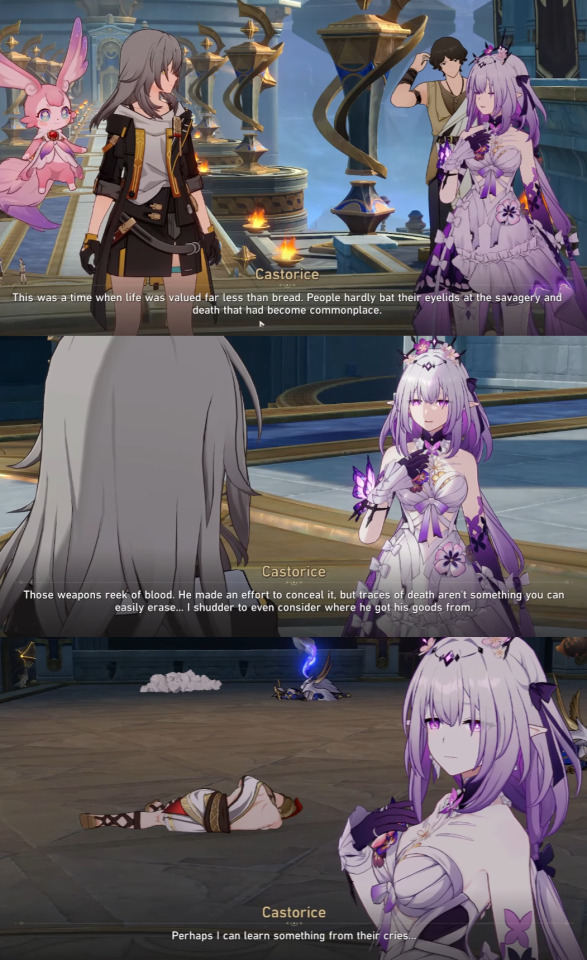
In the seemingly alternate timeline where Gorgo lives long enough to raise Mydei, the Kremnos we're presented with... looks a lot like Okhema. Looks a lot like the peaceful, idyllic Holy City where children frolic in the streets and the people are still full of light and life. By defying fate, we are shown (at least in some fragment of Amphoreus's timeline) that Gorgo achieves what she had longed for in Kremnos from the start, creating a better, gentler future for the people, prosperous and free of the cycle of Strife and meaningless violence that had plagued their kingdom for thousands of years. In this way, we can say that, for that lost timeline at least, Gorgo essentially achieved the Era Nova for Kremnos, ushering in a time of peace for her people. What Aglaea seeks, the game shows us that Gorgo was capable of achieving.
Conversely, Aglaea's path forward involves taking the complete opposite road: Rather than rejecting fate to create a better future, Aglaea seeks to embrace it. She has fully invested herself and her resources in the prophecy of the Flame Chase. She has to, because if there's no Era Nova to look forward to, then there's no hope at all for Amphoreus, and how can it be that something so beautiful is doomed to total destruction? If the Flame Chase Journey will end in a new start, if someone--anyone--will get to live to see the world born anew, then every sacrifice, every burden, every agony will have been worth it.
By embracing her prophesied fate instead of rejecting it, Aglaea is taking the same decisive stand as Gorgo, seizing the future of her world in her own hands and forcing Amphoreus along the path toward what she believes will definitely be a brighter future.
Not only does the description of Era Nova match the idyllic Castrum Kremnos we see under Gorgo's likely rule, but even the moments where both women truly make their stand and reckon with fate reflect each other as well: Gorgo demands her fellow Kremnoans stand with her, hoping they will see the wickedness of Eurypon's decision and reject blind faith in the prophecy they've been given. With her own strength, if even just Krateros alone had stood with her, she easily would have been able to push back against Eurypon's scheme. She lays out her vision for a different future, rejects the notions of the past, and is met with silence.
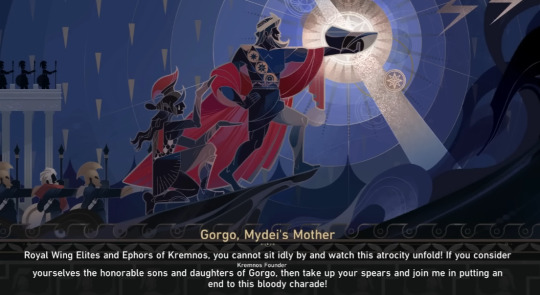
Meanwhile, Aglaea faces the Council of Elders in Okhema, where the decision about the Flame Chase Journey hangs in the balance, waiting on the final vote of a single person to join up with her cause. Just like Gorgo, the alignment of even one person to Aglaea's cause will make proof of her righteousness, prove the she's right. Aglaea lays down the gauntlet, demands the loyalty of her allies--and her leadership and vision are rewarded when Anaxa joins up with the cause, tipping the literal balance of the scales towards the new era Aglaea believes her efforts will bring to fruition.
(In essence, at the end of 3.2, we get to watch Anaxa do exactly what Krateros failed to--stand on the side of the woman who wields justice.)
Ultimately, through they do it through diametrically opposite paths--rejecting and embracing prophecy, respectively--both women are characterized by their drive to create change, their refusal to accept a quiet descent into cruelty and darkness. Both take a stand, outlining their vision for the right way to go on, for a better, softer, brighter world, seeking the loyalty of comrades to legitimize their causes, and--failing that--willing to make the ultimate sacrifice of themselves to further their truly noble causes.
The strength of both women lies not just in their martial prowess, but in their unwavering dedication to a just cause, no matter the cost to themselves.

Generational Influence
What actually started me off on this whole look at Gorgo and Aglaea as thematic parallels was Mydei's scenes with Aglaea, particularly how he clearly considers her a role model for ideal leadership. While I won't go so far as to say Aglaea perceives herself filling any sort of maternal role for Mydei, I think the connection is obvious on Mydei's end: Having never gotten the chance to truly meet his mother, Mydei is almost certainly projecting "the leader my mother would have been" onto Aglaea. (Or perhaps we should say the opposite: The empty spaces in Mydei's mind when he thinks of "Gorgo" are sutured closed with Aglaea's golden filigree.)
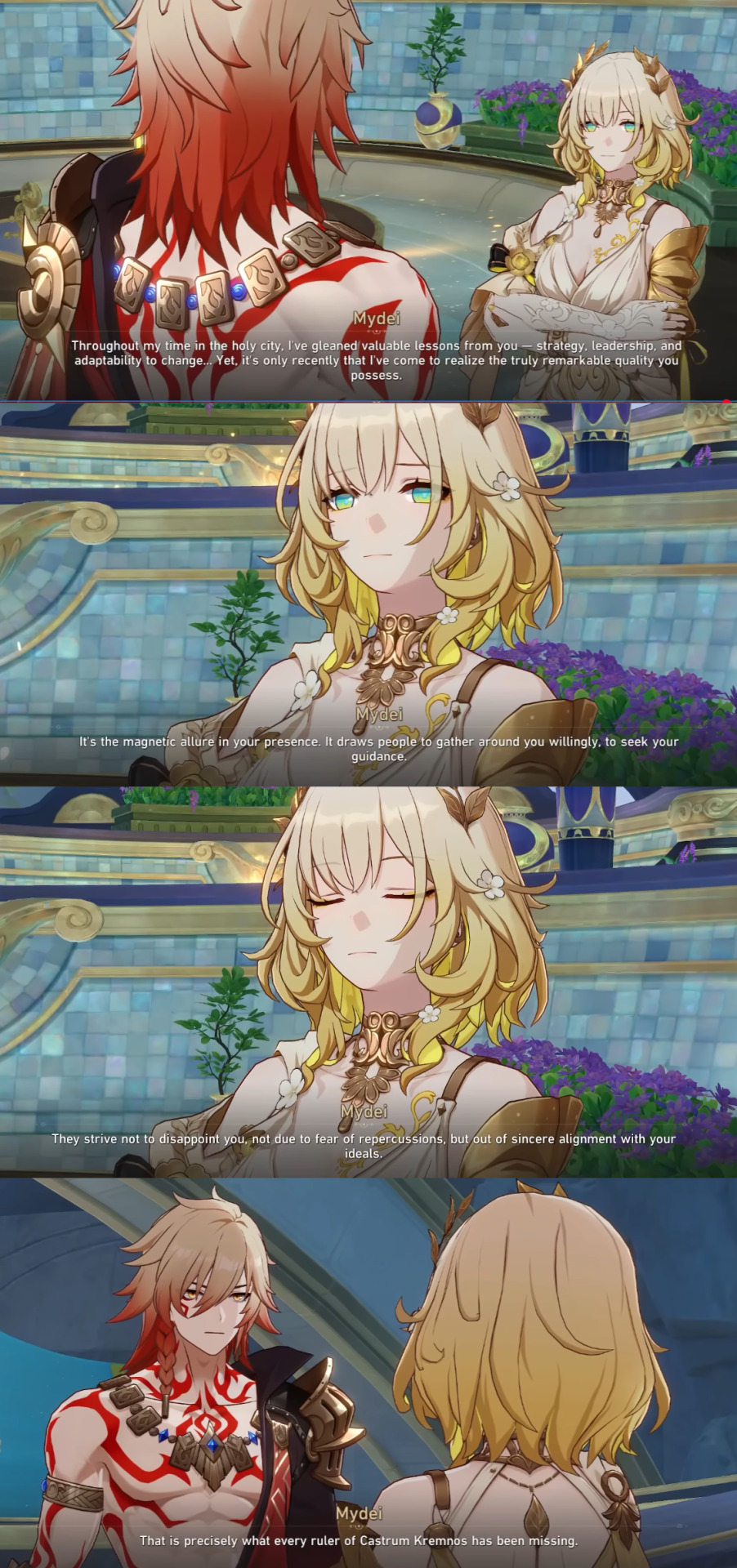
Does this sort of praise sound a bit familiar? It ought to, because this is how Krateros describes Gorgo:

Both women are characterized by their ability to move people's hearts, to inspire hope, and to model ideal strategy for others.
So how could Mydei do anything but link Aglaea's leadership with the life he imagines his mother would have led if she had had the chance to rule Kremnos?
Consider the entire situation from Mydei's perspective: His people have just been (forcibly) rescued from an insane king whose true downfall began with his betrayal of wife, their nation's one genuinely noble leader. If Gorgo had been their ruler, none of this suffering would ever have happened. Fleeing the madness and death Nikador is bringing to Kremnos, the entire surviving host of his people migrate to the "Holy City," the (supposed) last bastion of light and peace and happiness in Amphoreus--which is effectively ruled by a woman so powerful that she knows and sees all.
Seemingly effortlessly, she commands respect and fealty, marshaling her forces to do battle with the might of her own sword, while fighting to maintain the very same values Mydei's mother wanted to bring to her own nation. While being unafraid of bloodshed, she treasures life more than anything else. She's honest, direct, and unflinching, but still, despite everything, kind and dedicated to protecting the world she loves.
Mydei doesn't know his mother but there she is. There's the "queen" that his mother should have had the chance to be. There is the leader that Kremnos needed. There is the powerful woman whose dream for the future could have single-handedly changed the course of fate.
Clearly, for lack of personal experience, the Gorgo in Mydei's mind is less a real person and much more an idealized figure. His only direct knowledge of her comes from one "dream," where she tells him that he's more important than the world to her (undoubtedly leaving Mydei to grapple with the question of whether that is something she truly felt or something he just wishes to be true, by the way). Mydei's only other frame of reference for his mother is Krateros's blind veneration, with Krateros constantly holding Gorgo up as the standard Mydei should meet.

Gorgo is clearly on an achingly high pedestal for Mydei. He shaped his entire youth around the need to avenge her, and then he shaped his entire adult ideology around her vision for Kremnos. In "our" timeline, Gorgo may not have lived to create the change she hoped for, but her goal was ultimately achieved nonetheless, through the inter-generational influence her memory had over Mydei. It was Gorgo's hatred of wasteful bloodshed that helped Mydei to hate it too. It was Gorgo's desire to change Kremnos's traditions that led Mydei to consider tearing down its dynasty. It's his mother's gentle love for her people that echoes in Mydei's same affection.
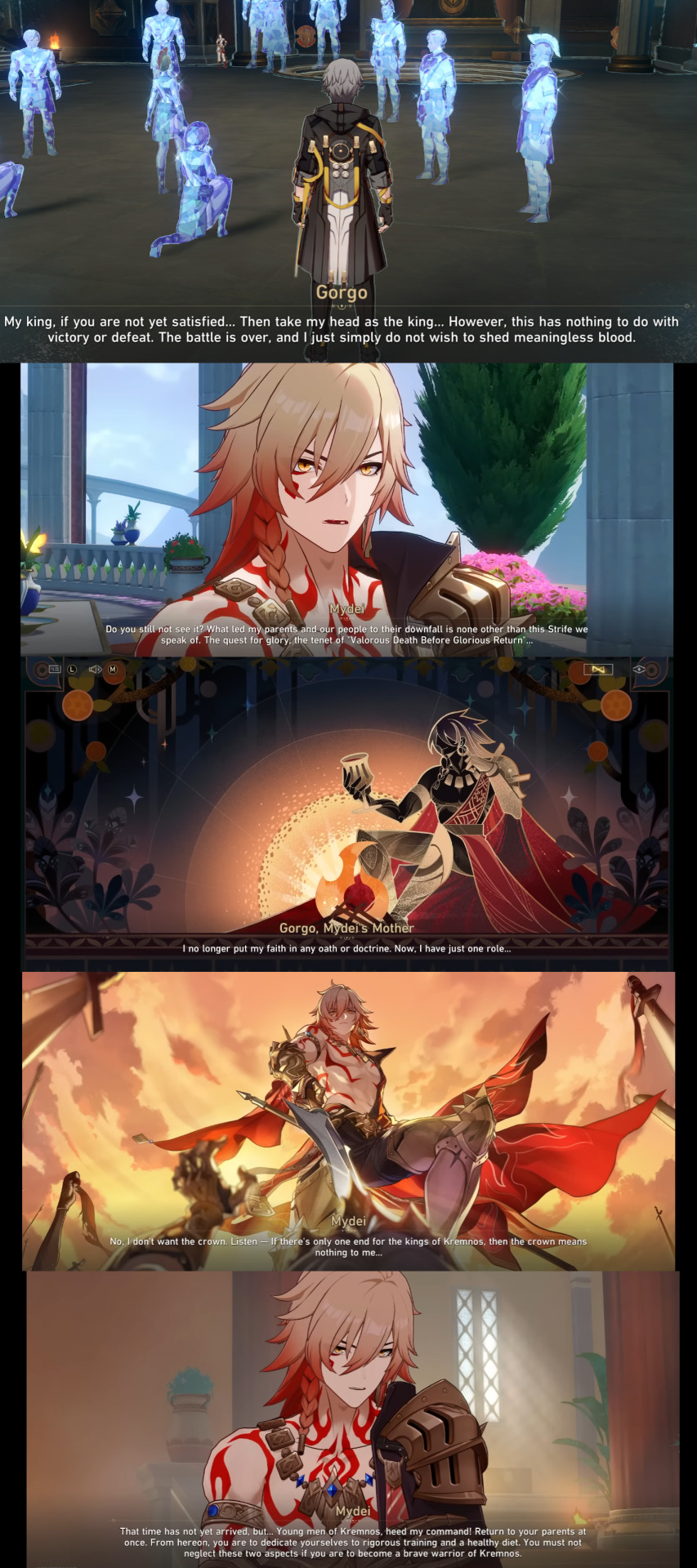
And through Aglaea, all those views and lessons were enforced. Before joining up with the Flame Chase Journey, the game tells us that Mydei's life was effectively still a hellscape even when he had his friends: They wandered the land with nowhere to call home and were attacked by (or themselves attacked) everyone they met, engaging in endless violence just to keep existing, while he watched his companions be brutally murdered one by one. At the risk of extreme understatement: Mydei was not living the life his mother wanted for him.
After joining the Flame Chase Journey, Mydei becomes one of the "heroes" who dedicates himself to protecting innocents and serving as a guardian; he finds a cause, does his best to create a new home for his people, and works to reshape their views towards the beliefs his mother espoused. Like Gorgo putting down her weapon and taking up the role of "just your mother," Mydei gets to (temporarily, briefly) let down his guard and live as just a person, cooking sweets, roleplaying with kids, and cuddling with chimeras.
He inches closer to the dream of finding meaning in finding peace.
And if it was Gorgo who inspired those choices, then it was Aglaea who made them possible--Aglaea who accepted the Kremnoan Detachment into Okhema, Aglaea who literally put aside her fear of Mydei to accept him as a fellow Chrysos Heir, Aglaea who guided him, Aglaea who modeled transformational leadership for him, Aglaea who gave him the final (if forceful) push he needed to commit to changing his people's future, destroying the bloodstained Kremnos of the past. In all his struggles to move forward, the threads of Aglaea and Gorgo's mirrored ideology lead Mydei through the labyrinth of uncertainty.
All things considered, Gorgo might actually be the character with the single most significant impact on Amphoreus's current plot other than the Trailblazer, because the guidance and beliefs she instilled in Mydei will live much longer than Gorgo and even Aglaea herself--may even live on through the end of the world and the rebirth of all of Amphoreus, because it is her exact ideology that becomes the backbone of Mydei's life advice to Castorice. When Castorice reveals their future, telling him the demigods of today's Amphoreus will become the titans of the new cycle, Mydei looks her in the eye and tells her the exact thing he learned from his mother and Aglaea:

Don't accept defeat--defy despair with everything you have and weave the future with your own two hands.
Perhaps nowhere do we see the parallels between Gorgo and Aglaea more clearly than in the "As I've Written" chapter, where we are told that what ultimately swayed Mydei's decision to join the Flame Chase Journey was when, completely without knowing it, Aglaea spoke the exact same words as his mother.
Though the organization of "As I've Written" is often unclear, making it difficult to determine which passages are actually linked to each other and which are entirely separate, I'm going to personally interpret the quote included in Mydei's third chapter as that special sentence once spoken by both Gorgo and Aglaea:
"The lion has its own historian, and the history of the hunt should not be held by the hunter alone."
Putting aside that all of this is completely impossible in the timeline as we know it (Mydei has no way of remembering the sentences his mother might have spoken to him, and none of the sentences in any flashbacks or her letter to him have anything to do with lions or historians), if this is the line echoed by both women, it is an obviously poignant phrase that would immediately signify to Mydei that Aglaea's ideology matches his mother's.
Although the English translation of "As I've Written" leaves A LOT to be desired (sometimes to the point of being entirely incomprehensible; I legitimately have no idea who okayed those translations, rife as they are with just straight up grammar errors lol), the origin of this phrase is unmistakable. It comes from the African proverb that is normally translated as:
"Until the lion has its own historian, the history of the hunt will always glorify the hunter."
Essentially, "History is written by the victors."
If we take the English translation seriously, what Aglaea and Gorgo would have been saying is that "the defeated" (which, by the way, is symbolized by the lion repeatedly in Kremnos's history) should have their own historian, and that no one should get to speak for them. That is, of course, that no one should get to speak for Mydei except himself--that he should take charge of his own destiny and write his own history into the books.
Krateros repeatedly insists that Mydei is the hunter, the one who should be controlling the whole hunting ground:
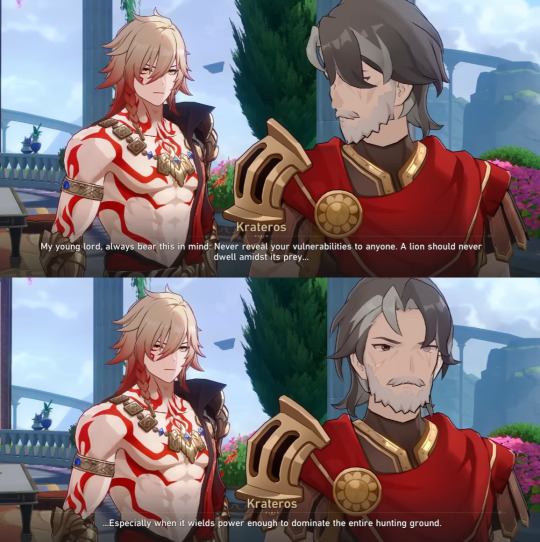
But Aglaea sees through Mydei in the first moment of meeting him--sees that he's not the victor but the victim, not the Kremnoan king-to-be but the "wandering lion" who is at risk of being slaughtered on the altar of Kremnos's glory. Kremnos's history is not the "hunting lion"--it's the lion hunt. Gorgo the founder killed the lion, Gorgo the mother killed the lion... So where does that leave Mydei, the symbolic lion?
This line is saying, Aglaea and Gorgo would both have been saying: I see you. I see that there's an entire unspoken legacy weighing on your shoulders, a horror you're fleeing from like wounded prey, a fierce desire in you to refuse the tale this world is writing for you. And in supposedly echoing Gorgo's words, Aglaea would also have echoed the very core of Gorgo's faith:
Those who have lost everything still deserve the chance to shape their own futures.
Those who have faced impossible odds, those who Fate itself has marked for death, those who would martyr themselves to secure the futures of others can and should still rage against the dying of the light, still fight with every tooth and nail to bring about a different ending.
When no one but (apparently) the ghost of Gorgo in his head had ever said it to him, Aglaea told Mydei:
If you want a different history, you can write it.
Of course he joined the Flame Chase Journey after seeing that its leader carries the very same deep-rooted goodness as his mother.
And while we're here talking about the mirrored ideologies and guidance both women have offered to Mydei, I also want to add a tiny aside about Aglaea's symbolic leadership of the other Kremnoans as well.
Although of course Mydei remains their de facto leader even in Okhema, Mydei himself makes a big deal out of the Kremnoans having submitted to Aglaea's authority, repeating in several places that the Kremnoans have a duty to follow her commands.

This isn't an off-hand statement; for someone who should have already been crowned king to state in his own words that his people should submit to someone else's authority is effectively tantamount to ceding his throne specifically to her--Mydei has essentially handed over the reins of Kremnoan leadership to Aglaea. He's the crown prince, but she's effectively the queen (that his mother never got to be). The promotional materials even label Aglaea and Mydei as occupying the same role ("King"). This is especially clear in how the Kremnoans refer to her. In multiple places, Aglaea is referred to as "the golden-haired usurper."
You don't get called a "usurper" unless people believe you're attempting to undermine their current ruler. In all but flat out saying it, the other Kremnoans perceive Aglaea as usurping Mydei's authority, despite Mydei himself willingly giving that power to her. Mydei isn't careless with the Kremnoans' futures, he doesn't shirk his duties as their crown prince, and he certainly would never surrender his power to a weak, unfit ruler. Undoubtedly, Mydei is comfortable with the idea of ceding authority to Aglaea in part because he recognizes his mother in her, sees the qualities that elevated Gorgo to royalty in Kremnos alive and well in Aglaea's Okhema. In this way, perhaps we could say that another factor contributing to Mydei's hesitance to take up Kremnos's throne might be a subconscious sense that the Kremnoans are already in the right hands, that Aglaea--embodying the ideal leadership Mydei projects onto the memory of his mother--is a better fit than he could ever be to lead them anyway?
Heck, while we're at it, I think it's even interesting that the cities of Okhema and Kremnos mirror each other so much, down to things that honestly don't make sense: We're told the legend explaining the lion heads on the walls in Kremnos, but... why are there are also talking lion heads all over Okhema's walls? Gorgo who tore the head off the Tretos lion is echoed in Aglaea, who rules a kinder, softer city still symbolized by the lion, where the talking lion heads get to be gossips and riddle masters instead of war strategists.

Okay, and the last silly thing I want to say: Aglaea would definitely not call herself a mother figure for Mydei, but after 3.2 reveals Gorgo's tough love methods, Aglaea's attempts at scolding him start to look pretty familiar, from her exasperated chiding to her genuine criticism:
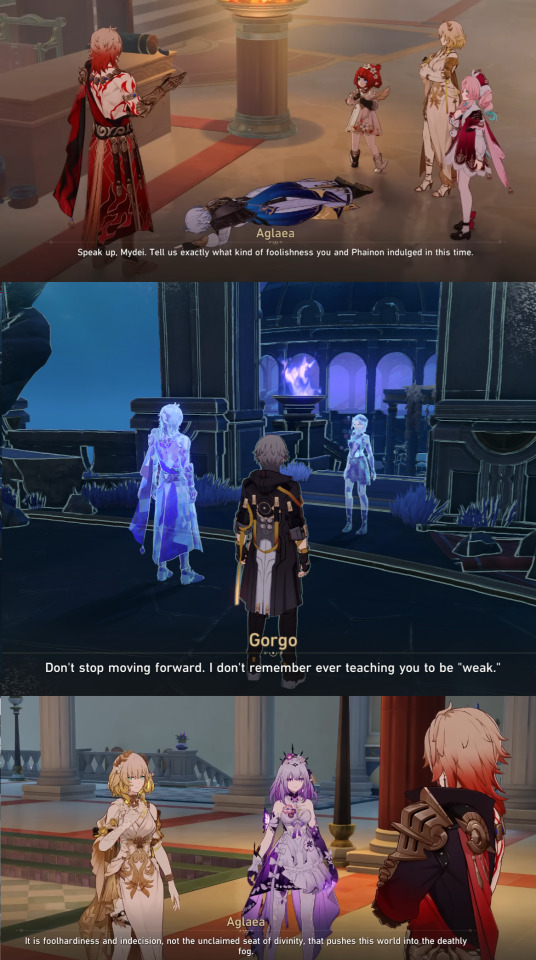
Mydei has it tough, having to meet the expectations of women like these lol.
To Fade from the World
Sorry, that was a bit too light-hearted for me, so time to end this post with some more pain:
A final point I think worth comparing between Gorgo and Aglaea is the ultimate fate that both of them face in the story: Gorgo is already gone, but Aglaea is not far behind.
Gorgo's death in particular is treated as abominable. Kremnoans may be warmongers and Strife worshipers, but they're supposed to be honorable about it. Key to their obsession with combat is the idea of noble combat, between contestants who are each given a fair chance. Despite being Gorgo's greatest ally, Krateros does not stand up and join her in her revolt against Eurypon, likely because of that same "might makes right" mindset that shaped so much of Kremnos's decision-making: If Gorgo's cause was truly righteous, then she should have been able to stand up for it herself and win a duel against Eurypon. If it had been a fair contest as expected by Kremnoan cultural standards, then whoever won would have been considered the "correct" person, and no one could have contested the fair results.
But Eurypon's cowardice drove him completely from the path of Kremnos's sacred virtues, causing him to betray their values by betraying his wife, using poison to deny her her fair chance in the duel. This action--forsaking the core tenets of Nikador's divinity--marks the truest extent of Eurypon's downfall, and cements that he is utterly unfit to rule, lacking both the courage to confront his wife in fair combat and the honor to reject under-handed schemes to ensure victory.
Gorgo's death is treated as a tragedy, an act that entirely shapes the course of the story through Mydei's loss to the sea and his subsequent quest for vengeance. It was cowardly betrayal that took away Kremnos's path to a brighter future, locking the self-fulfilling prophecy of Kremnos's downfall into place.
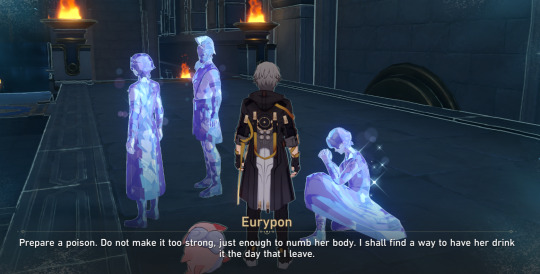
And this, of course, is a perfect mirror to the prophesied end Aglaea is going to face, possibly sooner rather than later. Upon their ascension as demigods, each Chrysos Heir is told how their life will end. Aglaea's prophecy states: "You shall have your final bath in warm and radiant gold."

As Aglaea is most often seen there, the assumption is that she will literally die in the baths--Mydei states this in-game, saying "If a normal person heard that prophecy, they'd probably just stop coming to the baths." Aglaea effectively dismisses this threat (in a very Kremnoan fashion even, lol) by simply saying "Well, who cares? I like baths!" Whatever will be, will be; if her assassin has the strength to end a demigoddess, then truly, it doesn't matter where she goes in Okhema or across the world--fate will find her.
Of course, there's also the possible interpretation that "final bath in gold" refers simply to bathing in her own golden Chrysos Heir blood...
But in either case, the prophecy, Mydei's comments, and some plot leaks I've seen all point towards a violent and unexpected end--likely at the hands of a betrayal.
Like Gorgo, Aglaea will not live to see the world she wished to create, the softer, golden future she wanted to bring to her people. At the hands of her enemies, either facing it with honor or in an unexpected moment of vulnerability, Aglaea will be eliminated before the final hour, fading from Amphoreus's memory as the survivors succeed--or fail--to usher in the new era she sacrificed everything to create.
Although both unique characters on their own, entirely separate from each other, examining Aglaea and Gorgo's parallel plot points, core character traits, and their roles and influences on others throughout the course of the story reveals yet another incredible "echo effect" in Amphoreus's writing, aligning opposites--Okhema and Kremnos, Beauty and Strife--through eerily similar patterns and revealing the enduring thematic threads that bind together the separate portions of Amphoreus's tale.
More than anything, Amphoreus feels to me like a very Hamilton-esque "Who lives, who dies, who tells your story?" plot, one that hinges on the question of who has the power to shape and reshape the future of their world, who has the power to break through a pre-ordained structure and bring about a better end--who has the courage to sacrifice it all to seize the reins of fate itself.
Through Aglaea and Gorgo, the story reinforces a message about women in power, women who perfectly balance violence (the traditional domain of male figures) with love, with beauty, and with righteousness to shake the foundations of their world. In what they value and how they lead, the story mirrors and mirrors again, mise en abyme, the message that those who are willing to give it all for the greater good are the true crafters of our story.
(Perhaps all this is preparing for the presence of another woman, one just as willing or more to do all that must be done to usher in a brighter future for her world?)
The history of the hunt should not be held by the hunter alone.
The lion has its own historian--and so too does the lioness.
Although Gorgo and Aglaea will both fall before that golden Era Nova can be achieved, the marks they have left on Amphoreus's plot, through their legacies of defiance and grace picked up and carried, torch-like, by other characters, demonstrate just how central both women were to all that happened in the world's past and all that will happen in its future.

#honkai star rail#aglaea#gorgo#mydei's mother#amphoreus#character analysis#hsr meta#this is the post I had mentioned starting a while ago#and ended up with a bit of a sour taste in my mouth over the hsr fandom#but then thinking about Aglaea and Gorgo revived my love#so fuck it we ball#two absolute queens#and the story makes a fantastic mirror image#of vastly different characters whose hearts are well aligned#Mydei's relationship with Aglaea is very precious to me#SHE WAS AFRAID OF HIM#and he's just like “I wish my mom was still alive so she could rule our country like you rule yours” T_T#like ma'am#that's your secret self-appointed mentee you had no idea was idolizing you and taking notes on your leadership#I wish we had gotten to see any of this in the game#Mydei's efforts to be more Aglaea-like for his own people lol#I'm also still laughing to myself#over the fact that Krateros clearly worshiped the ground Gorgo walked on#and then is like “AGLAEA IS THE WORST”#Sir???#that's the Okheman version of your grown ass man crush???#“It's Okheman so it's bad by default!!” >:[#I loved writing this post#but holy shit was it cursed#tumblr drafts died on me and lost half the text and half the images like THREE times DDD;
217 notes
·
View notes
Text
which is gayer





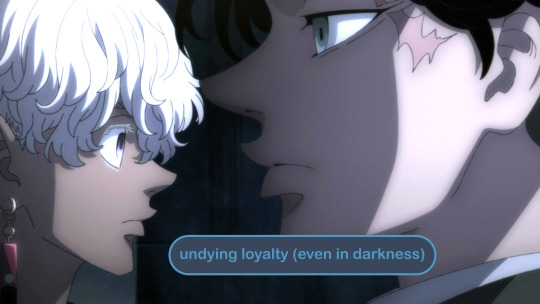


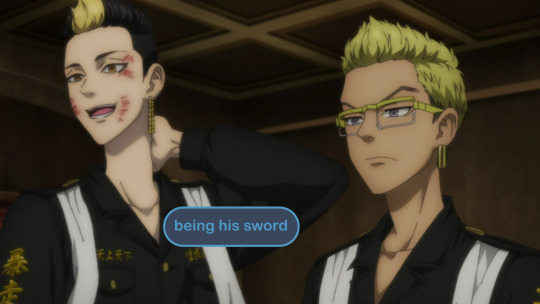

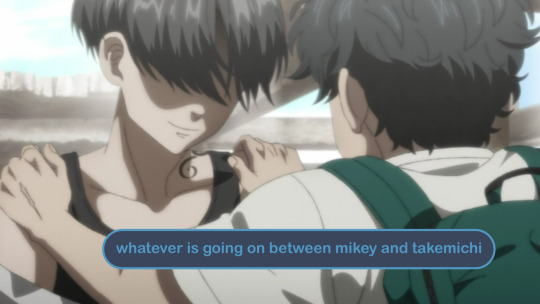
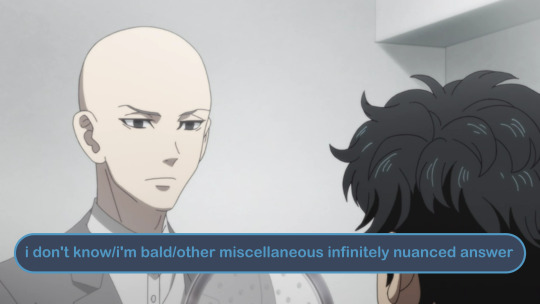
#tokrev#tokyo revengers#stuff i made#kisatake#kokonui#bajitora#yuzuhina#bajifuyu#izakaku#musan#doramai#hankisa#kazufuyu#takemikey#maitake#this took a long ass time to make lol#girl who made sure to put kisatake as the first option: yea im a multishipper i dont have favorites#lots of other good ships but since the tumblr poll only allows 12 options i added the final choice for everyone whose otp isnt there#also since these are anime screenshots some of them arent there yet#don't take this too seriously lol this is a joke poll#every ship in tr is just chefs kiss in my book#that being said i wonder who's going to take the lead#long post is long
531 notes
·
View notes
Text


Mother and son(s) are having a whale of a time ^^
Imma cooking something👁️👁️
I LIVE for the fic "Love him till the day that you die" on ao3 where Susan survives and comes back for Doey. I've also seen some other people make AUs where Jack's parents live and I think it's such a cool idea! I want that in my AU too, so Susan is alive, yeah (and kicking some sawyer ass)
#doey the doughman#doey ppt#poppy playtime doey#susan ayers#poppy playtime#poppy playtime chapter 4#poppy playtime fanart#ppt fanart#ppt chapter 4#(idk if i should even tag it cuz he's a scribble whose ass is just being kicked here lmao)#BUT:#harley sawyer#hlopok wip#poppy playtime au
153 notes
·
View notes
Text
Punch Out Drawing Collection RAHHHHHHH
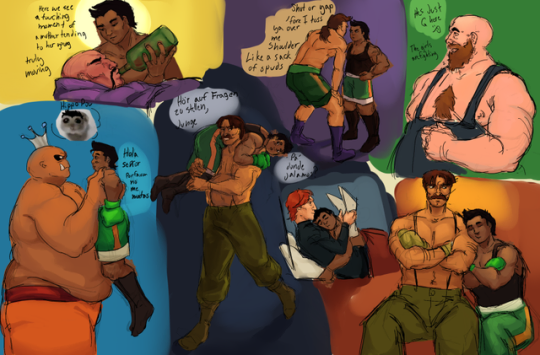
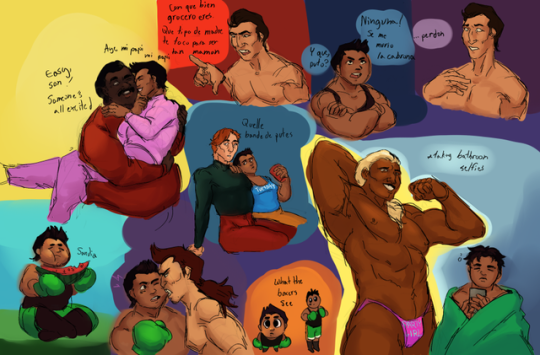


Close Ups and Translations in alt!!!
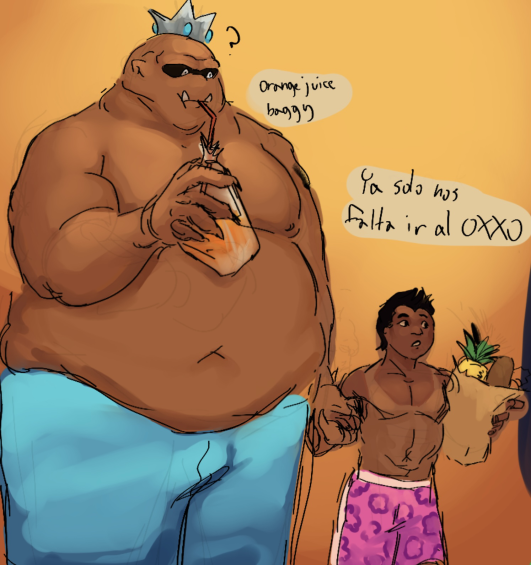
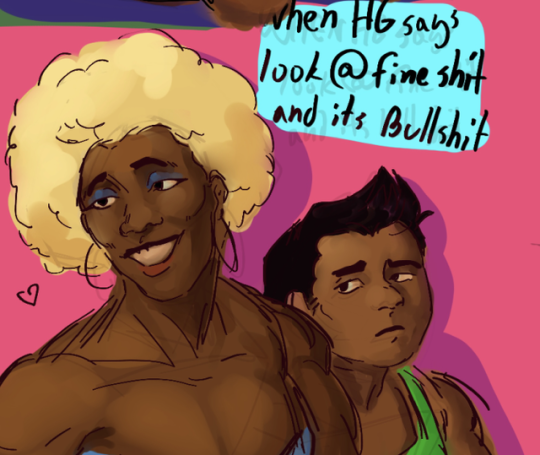


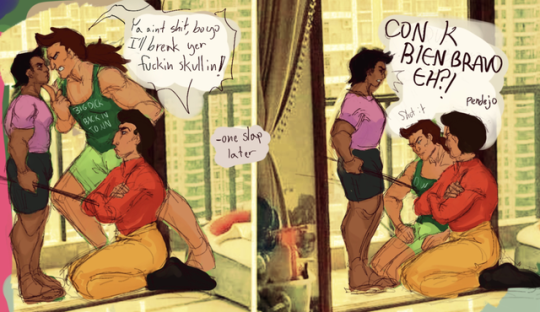
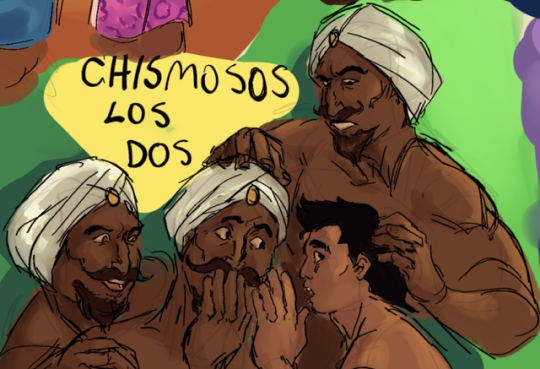
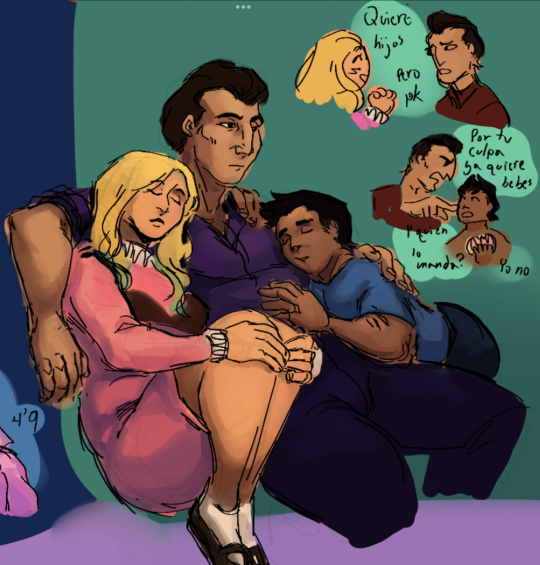








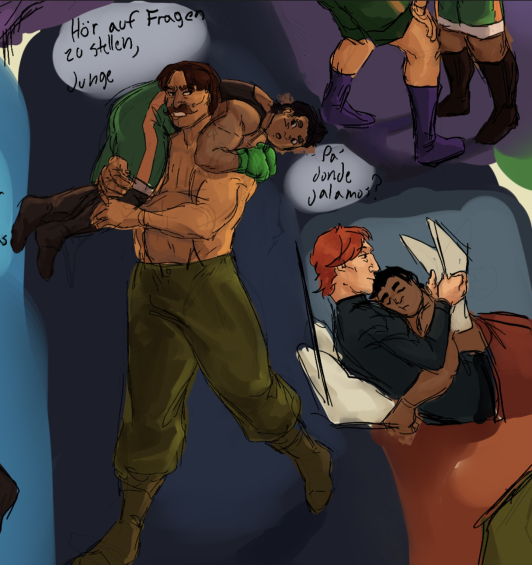





The last thing they see before the lights go out
#punch out#punch out wii#punch out!!#don flamenco#aran ryan#disco kid#great tiger#von kaiser#glass joe#super macho man#bald bull#little mac#bear hugger#piston hondo#king hippo#mr sandman#soda popinski#doc louis#little mac dont got parents or family#which means I gotta give him one#and sometyimes family is your coach and the ppl whose asses you beat#life is silly like that#this took me literally forever#think i died
321 notes
·
View notes
Text
Can we acknowledge how tragic of a detail this is? In ch114?

The fact that Teru views Kunishige (shrine grandpa) as the only one he can rely on despite how their relationship is at-best frenemies and at-worst hostile is downright devastating.
Reason #1: Teru and Kunishige’s relationship is predominantly negative.
In ch79, gramps was making jokes about threatening Teru’s livelihood and while Teru later joined in to counter, the comment was clearly in bad faith — an attempted power play to exert control over Teru and his flippant behavior. It’s a baseless threat stuffed within the carcass of a joke: “your family needs us — show respect.” Teru’s an instigator for sure, but he’s not the adult in this situation.

Point #2: Kunishige has done little to deserve Teru’s faith as an individual.
Shrine politics aside, gramps was beefing with a teenager and snitches on him to his dad! He pulled the “I’m telling Dad on you” with Teru’s OWN FATHER pushing 90 — like DAWG.

I don’t fault gramps for reporting the Red House incident given his past experiences or its history, but it was the professional choice — not the kind one. It doesn’t indicate any affection towards Teru nor resemble how you would treat a child you would go out of your way to support. Teru clearly has an adverse reaction to his father. He’s off-put by the idea of contacting him in ch79 and canonically views his father as absent and not someone he can expect help from in ch114. Not over Kunishige at least.
Yeah, gramps puts on the Santa suit per Teru’s request. That in itself is an undeniable act of kindness. He does care and I don’t doubt that he is there for Teru. But it’s not enough to deny this fact:

Conclusion: The only person (and adult) Teru feels he can rely on doesn’t treat him very well and won’t protect him from his father if it meant going against his shrine duties. A bottom of the barrel choice because it becomes unnervingly evident this child, Teru, as early as 14, grew up having no one else. He chooses Kunishige over his own father, family members, friends, teachers — everyone.
And Kunishige doesn’t even like him.
#tbhk#toilet bound hanako kun#jshk#jibaku shounen hanako kun#tbhk character analysis#tbhk ch114#teru minamoto#my tofu analysis#makes you wonder what kind of shit adults Teru had in his life if Kunishige is the best#teru’s dad just has to be ass#teru puts kunishige over everyone#over akane#that’s insane#at least according to this translation#his volatile relationship with gramps has to be part of the reason teru thinks bullying is affection#teru minamoto the ash of the fire that is your tragedy leaves your every word singed#characters whose suffering is less evident on top
196 notes
·
View notes
Text






the overreactors on reddit stories
#smosh#smosh pit#smosh reddit stories#angela giarratana#courtney miller#this was such a fun video#hope the woman whose fiancé called her the penguin left his ass#my post
76 notes
·
View notes
Text
No, but, explaining the complicated, ridiculous and amazing context of certain storylines/feuds/relationships to non wrestling fans is so funny.
Like, yeah… wrestling is just… weird and horny, I don’t know what to tell you.
#wrestling#yeah The Bucks have one joke and yeah Hangman said he was gonna Aussie open Kyle’s ass and yeah#and yeah there’s a dinasour whose dad has a faction called The Patriarchy#and yeah we have a Hollywood actress from the 50’s#lexie speaks
95 notes
·
View notes
